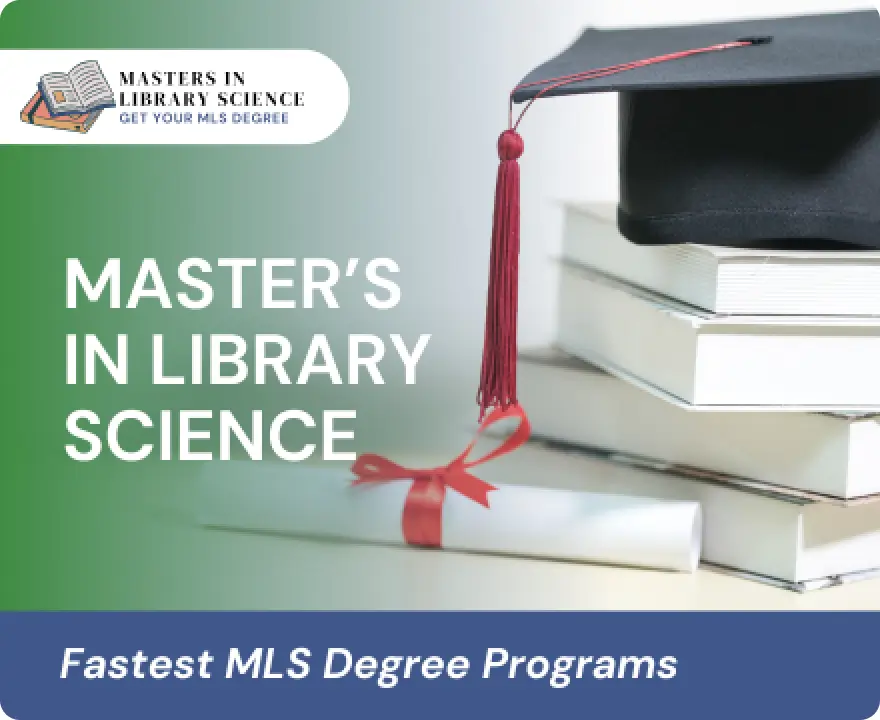Fastest Master's in Library & Information Science Degree Programs
Learn about the fastest MLIS degree programs available
- Fastest Master's in Library Science Degree Programs
- Fastest MLIS Degree Programs Available
- How to Expedite an MLIS Degree Program?
- How Fast Does the Standard MLIS Degree Program Take?
- Pros and Cons of Accelerated MLIS Programs
- Who Should Choose a Fast MLIS Degree Program?
- FAQs About Fast MLIS Programs
Fastest Master's in Library Science Degree Programs
Earning a Master’s in Library & Information Science (MLIS) is an excellent way to advance your career, and for many students, speed is a priority. The quickest MLIS degree programs are designed to streamline the graduate education process, allowing students to graduate in as little as 12-18 months. These programs, often offered online or in hybrid formats, are ideal for working professionals, career changers, or anyone eager to begin applying their skills in the workforce.
In this guide, we’ll explore accelerated degree programs, how to shorten your time to degree completion, and the standard timelines for traditional programs. Whether you’re looking for the fastest route or strategies to expedite a longer program, this page provides actionable insights to help you achieve your goals quickly.
2026 Fastest MLIS Program Options
| School Name | Highlights | Retention & Grad Rates |
|---|---|---|
| University of Denver |
|
|
University of Arizona
|
|
|
| University at Buffalo |
|
|
How to Expedite an MLIS Degree Program?
If you’re not enrolled in a specifically accelerated MLIS program, there are still ways to shorten the time it takes to complete your degree. Here are some proven strategies:
- Take More Credits Per Semester: Most programs require around 36-42 credit hours to graduate. By taking an extra course per term or enrolling in summer courses, you can significantly reduce your time to completion.
- Choose Online Programs: Online formats eliminate the need for commuting and often offer more flexible schedules, enabling students to complete their work at their own pace.
- Apply Transfer Credits: If you’ve completed graduate-level coursework in a related field, check whether your credits can transfer to your MLIS program.
- Skip Internships: Some programs allow students with professional experience in libraries or archives to waive internship requirements, saving time while meeting graduation standards.
- Focus on Core Requirements: Avoid taking electives that don’t align with your career goals to stay on track for early graduation.
These approaches, combined with careful planning and dedication, can help students graduate faster without sacrificing the quality of their education.

How Fast Does the Standard MLIS Degree Program Take?
The standard MLIS degree program typically takes 2 years of full-time study to complete. Students pursuing part-time options usually take between 3-4 years, depending on their course load and schedule. The timeline is influenced by several factors, including:
- Program Format: Traditional in-person programs often adhere to semester schedules, while online programs may offer accelerated terms or rolling admissions.
- Internship Requirements: Programs requiring fieldwork or internships may add an additional semester to the timeline.
- Specializations: Degrees with specialized tracks, such as Archival Studies or School Librarianship, may require additional coursework, lengthening the program.
While the standard program length is manageable for many students, those eager to finish quickly should consider accelerated or flexible programs.
Pros and Cons of Accelerated MLIS Programs
Before committing to an accelerated MLIS program, it’s important to weigh the benefits and challenges:
Pros:
- Faster Career Advancement: Enter the workforce sooner, gaining valuable experience and earning potential.
- Cost Efficiency: Shorter programs mean fewer semesters of tuition and related expenses.
- Flexibility: Many fast-track programs are offered online, making them ideal for working professionals.
Cons:
- Intensive Workload: Accelerated programs often require heavier course loads, which can be challenging for students with other commitments.
- Limited Electives: Fast-track programs may reduce the number of elective courses, potentially limiting customization.
- Fewer Networking Opportunities: Shorter programs may reduce the time students have to build relationships with faculty and peers.
Understanding these trade-offs can help you decide whether an accelerated program is right for you.
Who Should Choose a Fast MLIS Degree Program?
Fast MLIS programs are ideal for:
- Career Changers: Individuals looking to transition into library science quickly.
- Experienced Professionals: Those already working in libraries who want to advance their qualifications.
- Busy Professionals: People juggling work and family commitments who need flexible, online options.
If you’re motivated, organized, and eager to start your library science career, an accelerated program might be the perfect fit.
FAQs About Fast MLIS Programs
What is the quickest MLIS degree program available?
The fastest programs, like those at San Jose State University and Drexel University, can be completed in as little as 12-18 months for full-time students.
Are accelerated MLIS programs more expensive?
Not necessarily. While tuition rates per credit remain the same, fewer semesters often mean lower overall costs.
Can I work full-time while pursuing an accelerated program?
It depends on the program. Many online programs offer flexibility for working professionals, but the intensity of an accelerated format may require careful time management.

